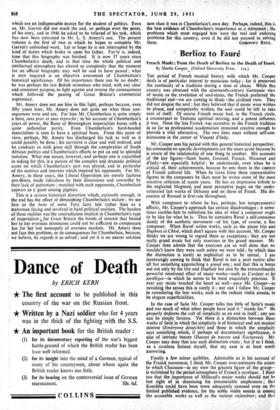Chamberlain (Continued)
The Life of Joseph Chamberlain. :1. n.. IV: :901-1903. II) IN 1915, six months after Joseph Chamberlain's death, Mr. L. S.._ Amery was asked to write the official biography of Chamberlain, under the supervision of Lord Milner. But more important matters intervened ; Mr. Amery had to make history instead of writing it. In turn, the biography was entrusted to Mr. J. L. Garvin, who during the next twenty years published, three monumental volumes
which are an indispensable source for the student of politics. Even so, Mr. Garvin did not reach the end, or perhaps even the point, of his story, and in 1946 he asked to be klieved of his task, which has now been entrusted to Mr. L. S. Amery's son. The present volume is the first of two in which he hopes to complete Mr. Garvin's unfinished work. Let us hope he is not interrupted by the kind of duties which broke in upon his father. For‘it is, indeed, time that this biography was finished. It is now 37 years since Chamberlain's death, and in that time the whole political and intellectual atmosphere has altered so completely that the moment for an official biography may well be said to have passed ; what is now required is an objective assessment of Chamberlain's historical significance. Of his importance there can be no doubt ; he was perhaps the last British statesman who tried, with any clear and consistent purpose, to fight against and reverse the consequences which followed the passing of Great Britain's commercial supremacy.
Mr. Amery does not see him in this light, perhaps because, even fifty years later, Mr. Amery does not quite see what these con- sequences were and are. For him Mr. Chamberlain is quite simply a hero, sans peur et sans reproche ; in his account of Chamberlain's years of power, the flame of Birmingham imperialism burns with a quite unfamiliar purity. Even Chamberlain's hard-headed materialism is seen to have a spiritual basis. From this point of view, perhaps, Mr. Amery has -discharged his task as well as it could possibly be done ; his narrative is clear and well ordered, and he conducts us with great skill through the complexities of South African politics and Chamberlain's efforts to put an end to splendid isolation. What one misses, however, and perhaps one is unjustified in asking for this, is a picture of the complex and dramatic political scene on which Chamberlain's part was played, and in particular of the motives and interests which inspired his opponents. For Mr. Amery, in these years, the Liberal Opposition are merely factious pro-Boers, made ridiculous by their dissensions and unworthy by their lack of patriotism ; matched with such opponents, Chamberlain appears as a giant among pigmies.
This is a serious historical distortion which, curiously enough, in the end has the effect of diminishing Chamberlain's stature ; we see him as the hero of some Tory fairy tale rather than as a statesman facing and involved in hard political realities. The hardest of these realities was the contradiction implicit in Chamberlain's type of imperialism for Great Britain the bonds of interest that bound her to her overseas dominions could not be sufficient to compensate her for her lost monopoly of overseas markets. Mr. Amery does not face this problem, or its consequences for Chamberlain, because, we believe, he regards it as solved ; and yet it is no nearer solution now than it was in Chamberlain's own day. Perhaps, indeed, this Is the best evidence of Chamberlain's importance as a statesman ; the problems which most engaged him were the real and enduring problems for this country, even if he did not succeed in solving



































 Previous page
Previous page